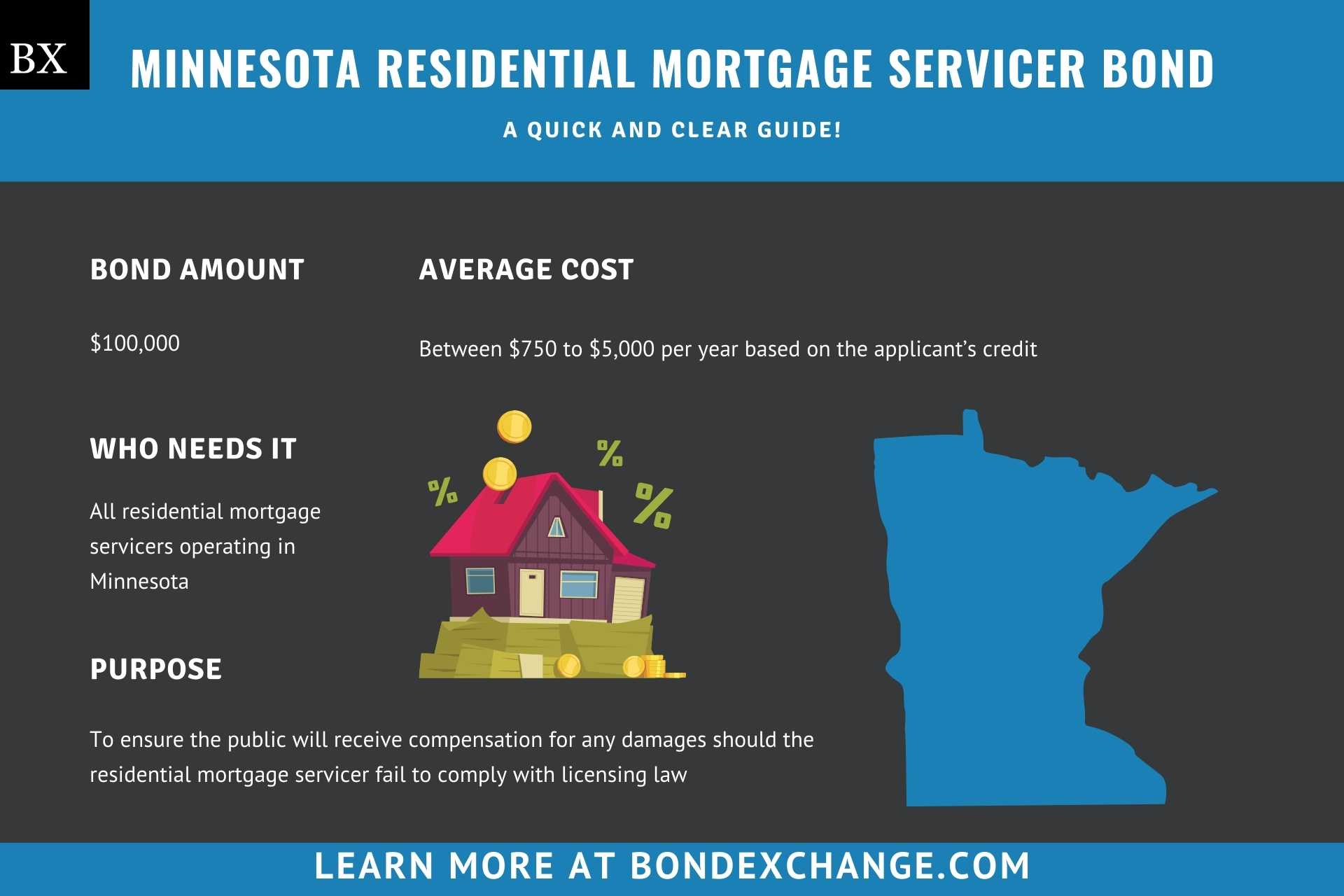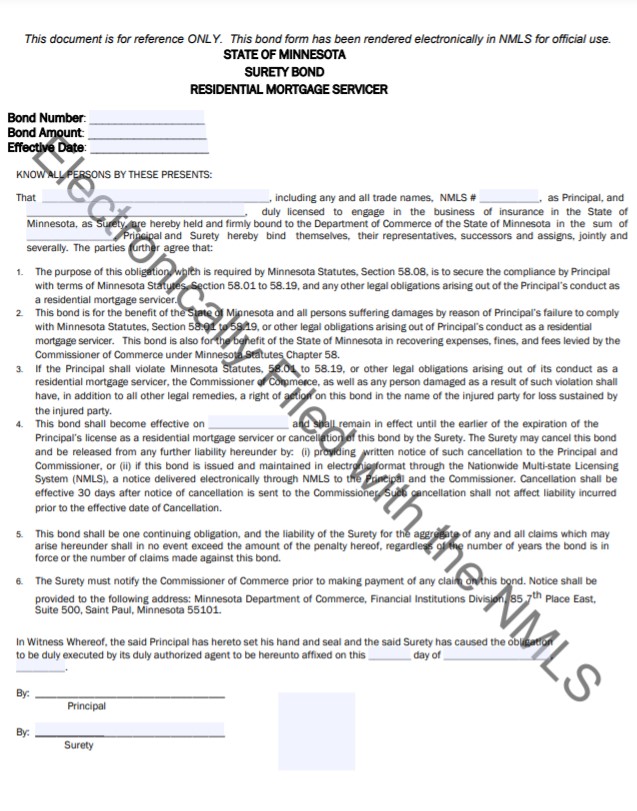Minnesota Residential Mortgage Servicer Bond: A Comprehensive Guide
July 1, 2021

This guide provides information for insurance agents to help their customers obtain Minnesota Residential Mortgage Servicer Bonds
At a Glance:
- Average Cost: Between $750 to $5,000 per year based on the applicant’s credit
- Bond Amount: $100,000
- Who Needs it: All residential mortgage servicers operating in Minnesota
- Purpose: To ensure the public will receive compensation for any damages should the residential mortgage servicer fail to comply with licensing law
- Who Regulates Residential Mortgage Servicers in Minnesota: The Minnesota Department of Commerce
Background
Minnesota statute 58.04 requires all residential mortgage servicers operating in the state to obtain a license with the Department of Commerce. The Minnesota legislature enacted the licensing laws and regulations to ensure that mortgage servicers engage in ethical business practices. In order to provide financial security for the enforcement of the licensing law, residential mortgage servicers must purchase and maintain a $100,000 surety bond to be eligible for licensure.
What is the Purpose of the Minnesota Residential Mortgage Servicer Bond?
Minnesota requires residential mortgage servicers to purchase a surety bond as part of the application process to obtain a business license. The bond ensures that the public will receive compensation for financial harm if the mortgage servicer fails to comply with the regulations set forth in Minnesota statutes chapter 58. Specifically, the bond protects the public in the event the mortgage servicer fails to pay all required taxes and fees or breaches any contracts made with consumers. In short, the bond is a type of insurance that protects the public if the residential mortgage servicer breaks licensing laws.

How Can an Insurance Agent Obtain a Minnesota Residential Mortgage Servicer Surety Bond?
BondExchange makes obtaining a Minnesota Residential Mortgage Servicer Bond easy. Simply login to your account and use our keyword search to find the “mortgage” bond in our database. Don’t have a login? Enroll now and let us help you satisfy your customers’ needs. Our friendly underwriting staff is available by phone (800) 438-1162, email or chat from 7:30 AM to 7:00 PM EST to assist you.
At BondExchange, our 40 years of experience, leading technology, and access to markets ensures that we have the knowledge and resources to provide your clients with fast and friendly service whether obtaining quotes or issuing bonds.
Is a Credit Check Required for the Minnesota Residential Mortgage Servicer Bond?
Surety companies will run a credit check on the mortgage servicing company to determine eligibility and pricing for the Minnesota Residential Mortgage Servicer bond. Owners with excellent credit and work experience can expect to receive the best rates. Owners with poor credit may be declined by some surety companies or pay higher rates. The credit check is a “soft hit”, meaning that the credit check will not affect the owner’s credit.
How Much Does the Minnesota Residential Mortgage Servicer Bond Cost?
The Minnesota Residential Mortgage Servicer bond can cost anywhere between $750 to $5,000 per year. Insurance companies determine the rate based on a number of factors including your customer’s credit score and experience. The chart below offers a quick reference for the approximate bond cost on the $100,000 bond requirement.
$100,000 Residential Mortgage Servicer Bond Cost
| Credit Score | Bond Cost (1 year) |
|---|---|
| 700+ | $750 |
| 650 – 699 | $1,000 |
| 625 – 649 | $1,250 |
| 600 – 624 | $1,880 |
| 550 – 599 | $4,000 |
| 450 – 549 | $5,000 |
How Does Minnesota Define “Residential Mortgage Servicer”?
Minnesota statute 58.02 defines a residential mortgage servicer as any individual or business entity who collects mortgage payments from a residential mortgage holder.
How do Residential Mortgage Servicers Apply for a License in Minnesota?
Residential mortgage servicers in Minnesota must navigate several steps to secure their license. Below are the general guidelines, but applicants should refer to the NMLS’s application guidelines for details on the process.
License Period – The Minnesota Residential Mortgage Servicer License expires on December 31 of each year and must be renewed before the expiration date
Step 1 – Purchase a Surety Bond
Residential mortgage servicers must purchase and maintain a $100,000 surety bond
Step 2 – Purchase Workers’ Compensation Insurance
Applicants for the Minnesota Residential Mortgage Servicer License must purchase workers’ compensation insurance and submit proof of insurance with their application
Step 3 – Request a NMLS Account
The Minnesota Residential Mortgage Servicer License application is submitted electronically through the Nationwide Multistate Licensing System (NMLS). To submit a license application, applicants must first request to obtain an NMLS account.
Step 4 – Complete the Application
All Minnesota Residential Mortgage Servicer License applications can be completed online through the NMLS. Applicants must complete the entire application, and submit the following items:
-
- Proof of workers’ compensation insurance
- Bank account information for all accounts held in a fiduciary capacity
- Certificate of Good Standing
- Company formation documents
- Affirmation Under Oath
Residential mortgage servicers must pay a $600 licensing fee when submitting their application.
How Do Minnesota Residential Mortgage Servicers Renew Their License?
Residential mortgage servicers can renew their license online through the NMLS. License holders need to simply login to their account to access their renewal application. The Minnesota Residential Mortgage Servicer License expires on December 31 of each year and must be renewed before the expiration date.
What are the Insurance Requirements for the Minnesota Residential Mortgage Servicer License?
Minnesota requires residential mortgage servicers to purchase workers’ compensation insurance as a prerequisite to obtaining a business license. Residential mortgage servicers must purchase and maintain a $100,000 surety bond.
How Do Minnesota Residential Mortgage Servicers File Their Bond?
Residential mortgage servicers should submit the completed bond form, including the power of attorney, electronically through the NMLS. The surety bond requires signatures from both the surety company that issues the bond and a representative from the mortgage servicing company. The surety company should include the following information on the bond form:
- Legal name and NMLS number of entity/individual(s) buying the bond
- Surety company’s name
- Bond amount
- Date the bond goes into effect
- Date the bond is signed
What Can Minnesota Residential Mortgage Servicers Do to Avoid Claims Against Their Bond?
To avoid claims on their bond, residential mortgage servicers in Minnesota must follow all license regulations in the state, including some of the most important issues below that tend to cause claims:
- Pay all required taxes and fees
- Do not engage in any acts of fraud
- Honor all contractual obligations
What Other Insurance Products Can Agents Offer Residential Mortgage Servicers in Minnesota?
Minnesota requires residential mortgage servicers to purchase workers’ compensation insurance as a prerequisite to obtaining a license. Bonds are our only business at BondExchange, so we do not issue liability insurance, but our agents often utilize brokers for this specific line of business. A list of brokers in this space can be found here.
How Can Insurance Agents Prospect for Minnesota Residential Mortgage Servicer Customers?
The NMLS conveniently provides a public database to search for active residential mortgage servicers in Minnesota. The database can be accessed here. Contact BondExchange for additional marketing resources. Agents can also leverage our print-mail relationships for discounted mailing services.

